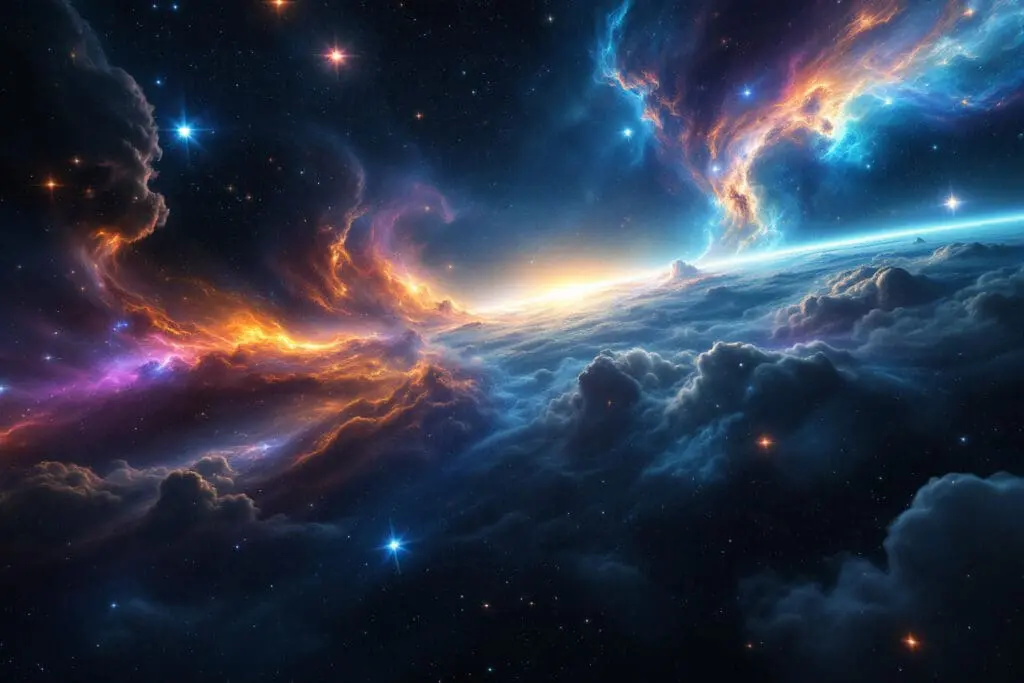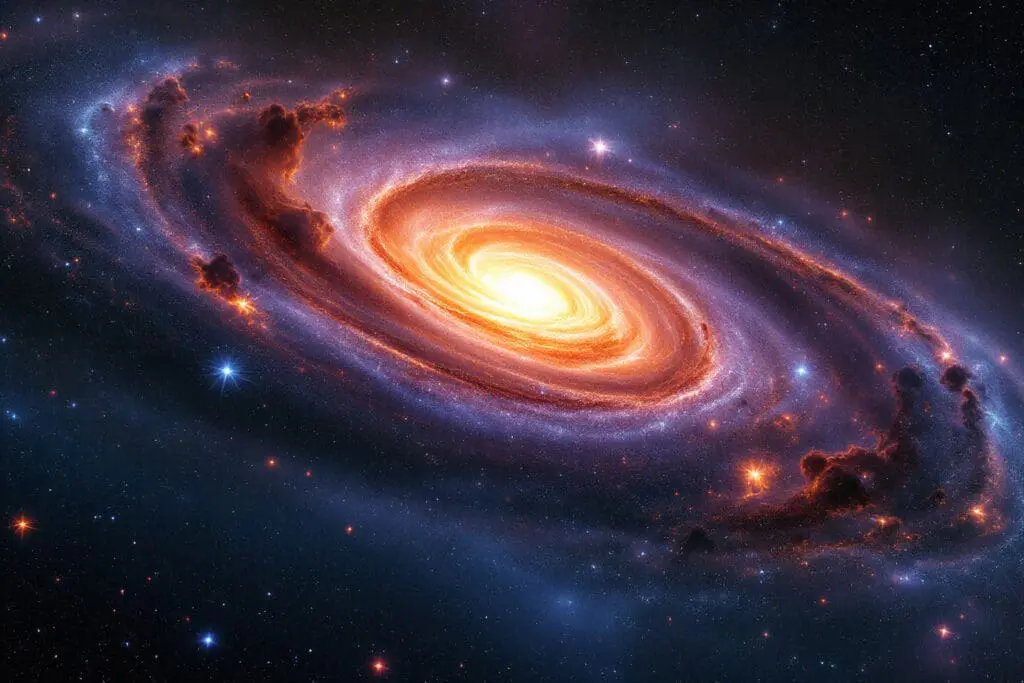Ever look up at the night sky, just completely floored by how huge it all is, and wonder… what is all that? Is it “space”? Or is it “the cosmos”? Most of us use the words interchangeably, and nobody gets confused. But if you pull on that thread, you’ll find a fascinating and important distinction. Getting the difference between cosmos and space isn’t just about being nitpicky with words. It’s about completely changing how we see the universe and our little spot in it.
One word is just a place, a big empty stage. The other is the whole show—the stage, the actors, the script, and the story. This is more than a vocabulary lesson. It’s about learning to see both the elegant order and the wild beauty that we’re a part of. So, let’s jump in and sort out these two massive ideas.
More in The Big Picture Category
How Cosmology Explains Our Origin
Key Takeaways
- Space is the place. It’s the three-dimensional, mostly empty area that starts where our atmosphere stops. Think of it as the giant container or the stage itself.
- The Cosmos is the whole system. This includes not just space, but everything in it: every galaxy, star, planet, all energy, and even the laws of physics that run the show. It’s the complete, interconnected package.
- Word Origins Tell the Story: “Space” derives from the Latin word for “area,” highlighting its emptiness and size. “Cosmos” comes from the Greek kosmos, which means “order” and “harmony.”
- It’s All About Perspective: Thinking about “space” usually leads to ideas of exploration and distance. Pondering the “cosmos,” on the other hand, pulls you into a more philosophical mindset, making you think about how you connect to the entire universal system.
So, What Exactly Are We Talking About When We Say ‘Space’?
Let’s tackle the easy one first: space. What pops into your head when you hear that word? For most of us, it’s probably the black, star-dusted emptiness from all those NASA pictures. The final frontier. The place where astronauts do their spacewalks. That’s a perfect place to start.
Scientifically, “space” is the seemingly endless, 3D void where everything exists. It’s the near-vacuum that takes over where a planet’s air runs out. It’s the arena for everything that happens. You can measure it. You can chart a course through it. At its heart, it’s a physical concept—a colossal emptiness with “stuff” scattered throughout.
This is precisely why we call it “outer space.” That little word “outer” signals a division. There’s our world, and then there’s the vast location outside of it, a place defined more by what it doesn’t have than what it does.
Is Space Just a Big Nothing?
Not quite. While we call it a near-vacuum, space isn’t truly, perfectly empty. The stuff between the stars, called the interstellar medium, is an incredibly thin soup of gas, dust, and plasma, all bathed in electromagnetic radiation. You’ve also got cosmic rays zipping through, ghostly particles called neutrinos, and of course, the ever-present mystery of dark matter and dark energy, which scientists believe make up most of everything.
Still, the defining feature of space is its mind-bogglingly low density. The gap between those individual atoms is just enormous. If you could somehow cup your hands in the deepest void between galaxies, you’d be lucky to hold a single atom. Now think about the trillions of atoms in one breath of air. So, while it’s not a perfect void, its essence is emptiness. It’s the background. The canvas.
How Do Scientists Know Where Space Officially Begins?
For practical reasons, we needed a line in the sky. Where does our world end and space start? There isn’t a physical wall, of course, but the most accepted boundary is the Kármán line. This is an imaginary border 100 kilometers (that’s about 62 miles) straight up.
Why that specific altitude? It’s basically the point where flying ends and rocketry begins. Above the Kármán line, the air is so thin that a plane would have to fly faster than orbital speed just to get enough lift from its wings to stay up. Simply put, it’s where you need to fire thrusters instead of relying on wings. It’s the official front door to outer space, a location defined by the pure physics of getting there.
Then How is the ‘Cosmos’ Any Different?
Alright, so if space is the empty stage, the cosmos is the entire play. The word “cosmos” describes the universe as a complex, ordered, and unified system. It’s a holistic idea. It absolutely includes space, but it also includes every single thing within it. All the galaxies, stars, planets, and moons are in the cosmos. All the light, heat, and energy are in the cosmos.
Here’s the most important part: the cosmos also includes the fundamental laws that run the whole show. Gravity, electromagnetism, the forces holding atoms together, relativity, time itself—these are the rules of the cosmos. They are the script that every actor (all the matter and energy) must follow on the stage (space). The cosmos is the complete production, a single, working entity.
Does ‘Cosmos’ Suggest Something More Than Just a Bunch of Stuff?
It really does. The word carries a philosophical weight that “space” just doesn’t have. It hints at an underlying order, a deep structure, maybe even a kind of harmony. This is intentional; it’s built into the word’s DNA. Thinking about the cosmos pushes us to ask the biggest questions. How did this whole elaborate system get here? What are the bedrock rules that make it all tick? And where do we fit into this enormous, connected web?
When the astronomer Carl Sagan made his legendary TV show, he didn’t call it Space. He called it Cosmos. That choice was critical. He wasn’t just showing off pretty pictures of planets. He was explaining the laws of physics, the story of evolution, and our own place in this grand, orderly system.
Where Did That Word Even Come From?
The word’s history tells you everything you need to know. It’s from the ancient Greek word kosmos (κόσμος), which meant “order,” “arrangement,” and even “ornament” or “adornment.” The ancient Greeks, especially thinkers like Pythagoras, were fascinated by the predictable, clockwork movements of the heavens. They looked up and saw not chaos, but an elegant, harmonious machine.
For them, the universe was a beautifully arranged system. The opposite of kosmos was chaos—the shapeless, random nothingness that came before creation. So from its birth, “cosmos” was a word for a universe that made sense, one driven by principles you could actually figure out. That ancient idea is the direct ancestor of modern science itself.
Can You Give Me an Analogy to Make it Clearer?
Let’s try an analogy. Picture a massive ocean.
- Space is the water. It’s the huge, deep, 3D substance that fills the ocean basin. You can sail on it and dive in it. It’s the physical environment.
- The Cosmos is the entire ocean ecosystem. It’s not just the water. It’s the whales, the fish, the plankton, the strange creatures around volcanic vents, the currents, the tides, the salt, and the chemistry. It’s the laws of biology that drive the food chain.
You can’t claim to understand the ocean by only studying H₂O. In the same way, you can’t understand our reality by only studying space. You have to study the cosmos.
Why Do We Use These Words Interchangeably If They’re So Different?
Honestly, the mix-up makes sense. In a normal conversation, the distinction feels a bit academic. If you say you want to be an astronaut and fly in space, people get it. The deeper philosophical meaning doesn’t really matter when you’re just trying to talk about “all that stuff up there.”
Language is efficient. We’re stuck down here on Earth, so everything beyond our atmosphere tends to get tossed into one big, simple bucket. The finer details get smoothed over. But as we learn more, our need for more precise language grows with it.
So it’s Just a Case of Everyday Talk vs. Science Talk?
That’s a huge part of it. Scientists and philosophers need laser-precise words. A physicist wrestling with the fundamental forces of nature has to think in terms of the “cosmos” because she’s studying the rules of the entire system. An aerospace engineer, on the other hand, might be more concerned with “space” as a location—a region with specific physical properties like low pressure and extreme temperatures that a spacecraft must be designed to withstand.
Here’s a list to break down the focus:
- Space (The Location):
- Emphasis on distance, volume, and coordinates.
- Focus on navigation and exploration.
- Concerned with the physical environment (vacuum, radiation).
- Primary interest of astronautics, rocketry, and satellite engineering.
- Cosmos (The System):
- Emphasis on laws, principles, and interconnectedness.
- Focus on origins and evolution (cosmology).
- Concerned with the fundamental nature of reality.
- Primary interest of astrophysics, theoretical physics, and philosophy.
Does Pop Culture Play a Role in This Confusion?
Without a doubt. Science fiction has had a huge influence on how we talk about everything beyond Earth. Franchises like Star Trek and Star Wars are filled with “spaceships” traveling through “space.” The drama is often centered on navigating the dangers of this location—asteroid fields, black holes, hostile alien territory. The narrative is about conquering the vast emptiness of space.
Fewer stories, outside of more philosophical works, are explicitly about exploring the cosmos. While they operate within its rules, the focus is less on the underlying order and more on the adventure within the void. This has cemented “space” as the go-to word in the public imagination for the great beyond.
Does This Distinction Actually Matter?
Beyond a trivia night, does this difference have any real significance? Yes, it does. The word you choose frames your entire mindset. It changes the questions you ask and the way you view your own existence.
Thinking only about “space” can make the universe feel like a cold, empty, and disconnected place. It positions humanity as explorers charting a vast and indifferent void. The goal becomes about travel, colonization, and overcoming the tyranny of distance. It’s an external challenge to be conquered.
Thinking about the “cosmos,” however, changes the narrative. It reframes the universe as a single, unified system of which we are an integral part.
How Does Thinking About the ‘Cosmos’ Change Our Perspective?
Contemplating the cosmos fosters a sense of connection. The same physical laws that govern the most distant quasar also govern the atoms in your body. The iron in your blood was forged in the heart of a dying star billions of years ago. We are not just in the universe; we are the universe experiencing itself. As Carl Sagan famously said, “The cosmos is within us. We are made of star-stuff.”
This perspective encourages humility and wonder. Instead of seeing a void to be filled, we see an intricate web of relationships to be understood. It shifts the focus from “what’s out there?” to “what does it all mean?” and “how do we fit in?” It inspires us to look for patterns, to appreciate the elegance of physical laws, and to feel a sense of belonging to something immeasurably vast and ancient. It is the difference between being a tourist in a foreign land and being a citizen of the entire world.
What’s the Real-World Impact for Scientists and Philosophers?
For scientists, this distinction is fundamental. The field of cosmology is not about mapping space; it’s about understanding the origin, evolution, and eventual fate of the universe as a system. Cosmologists study the Big Bang, cosmic inflation, the nature of dark energy, and the geometry of spacetime. They are trying to read the rulebook of the cosmos.
For philosophers, the concept of the cosmos has been a source of inquiry for millennia. It raises questions about determinism and free will (if we’re part of a lawful system), the nature of time, and the potential for meaning in a universe that, according to science, arose from natural processes. The search for our place in the cosmos is one of the most enduring human quests. It drives our art, our religion, and our deepest scientific curiosities.
In the end, the difference is profound. Space is the house. The cosmos is the home.
One is a set of coordinates, a physical reality of distance and emptiness. The other is a system of belonging, a web of laws and matter, a story of becoming that includes us in its telling. So the next time you look up at the night sky, take a moment to decide what you’re really seeing. Are you looking out into the cold, empty expanse of space? Or are you looking into the heart of the magnificent, interconnected cosmos? Your answer might just change everything.
FAQ – Difference Between Cosmos and Space

In what ways do popular culture and science education influence our understanding of space and the cosmos?
Popular culture, through science fiction and media, often depicts space as a vast empty frontier primarily focused on exploration and adventure, which can reinforce viewing space as a place of conquest. Science education and philosophical discussions, however, encourage considering the cosmos as an interconnected system, deepening our understanding of the universe’s order, laws, and our place within it.
Why is the universe referred to as ‘the cosmos’ instead of just ‘space’?
The term ‘cosmos’ emphasizes the universe’s order, harmony, and interconnectedness, reflecting a holistic view. It includes not just the physical space, but the laws, principles, and the underlying system governing all matter and energy, offering a philosophical perspective on the universe’s structure and origins.
How do scientists define the boundary where space begins?
Scientists often define the beginning of space using the Kármán line, an imaginary boundary at approximately 100 kilometers (62 miles) above Earth’s sea level. This is where the atmosphere becomes too thin for conventional aircraft to generate enough lift, and spacecraft require rocket propulsion to stay in orbit.
What is the primary difference between space and the cosmos?
Space is the three-dimensional, mostly empty environment that begins where Earth’s atmosphere ends, serving as the physical expanse in which celestial bodies exist. The cosmos, on the other hand, encompasses the entire universe, including all matter, energy, laws, and the interconnected system that makes up everything within space.

